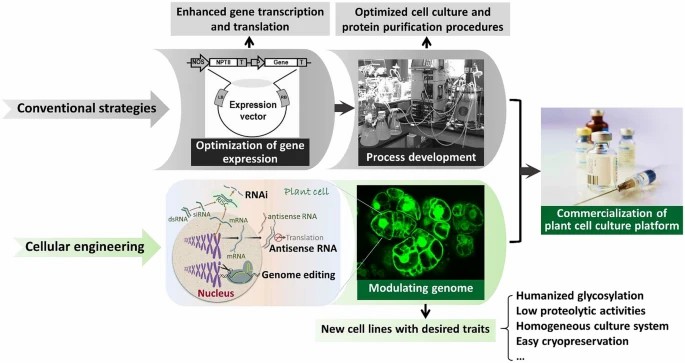Plant biomolecular engineering is the modification of plants or plant material to produce new compounds or to increase the efficiency of beneficial products. Lifeasible is one of the world's most innovative plant biotechnology companies, offering comprehensive biomolecular engineering services in plants. Plant biomolecular engineering involves two main applications:
Prokaryotic and eukaryotic expression host systems, including bacterial, yeast, insect, and mammalian cells, are widely used for recombinant protein production. However, these systems have cost, scalability, safety, and protein quality/authenticity limitations. Plant expression systems are low-cost, scalable, safe, and environmentally friendly. Their potential is to provide promising biological production platforms for therapeutic proteins. Modern molecular biology tools, especially RNAi and the latest genome editing technology, CRISPR/Cas9, have been used to modulate the genome of plant cells to create new cell lines that exhibit the "signature" required for producing therapeutic proteins.
Plants are sustainable organisms because they accumulate carbon and synthesize beneficial metabolites through photosynthesis. In response to the challenges to food security and health posed by population growth and the depletion of non-renewable natural resources, plant molecular engineering can generate high-yield biomass components for use as primary food sources and as biofuel feedstocks. Accompanied by rapid advances in plant synthetic biology and gene editing technologies, a wide range of complex bioactive substances have been realized for plant synthesis.
 Fig. 1. Schematic illustration of strategies used to enhance plant cell culture productivity for bioproduction and commercialization. (Karki, et al., 2021)
Fig. 1. Schematic illustration of strategies used to enhance plant cell culture productivity for bioproduction and commercialization. (Karki, et al., 2021)
Lifeasible has extensive experience in plant biomolecular engineering and provides comprehensive plant biomolecular engineering services to clients worldwide, focusing on enhancing biomass processing through plant cell wall engineering. Our highly skilled scientists and experts have been dedicated to exploring and optimizing plant molecular engineering methods for decades. We proudly offer competitive plant biomolecular engineering services for various plant species. We have also established valuable international partnerships with renowned companies to provide you with the best solutions for conducting your research projects.
Unlike other bioproduction systems, plant systems with multiple platforms ranging from whole plants to in vitro cell and tissue cultures and stable transformation using transient expression via viral or non-viral vectors or using transgenes targeting the nuclear or chloroplast genomes, which can be used for a wide range of applications in human food, animal feed, fiber, fuel, and pharmaceutical production. Lifeasible offers plant cell wall engineering solutions for enhanced biofuels:

Plant biomass consists primarily of cell walls, which are complex composite materials composed of various polymer networks, including many polysaccharides and polyphenolic lignins. Therefore, Plant cell walls are a renewable resource to produce biofuels and/or other commodity chemicals, especially since lignocellulosic feedstocks do not represent a food source for humans. For the biorefinery process to be economically viable, many barriers must be overcome. One such barrier includes optimizing quantitative agronomic traits by increasing the yield of lignocellulosic biomass per hectare. Another obstacle includes the quality characteristics of lignocellulosic biomass. Lifeasible offers plant cell wall engineering solutions to address both recalcitrant issues without compromising plant growth and biomass accumulation.
To learn more about our services, please feel free to contact us for more information.
Reference
Lifeasible has established a one-stop service platform for plants. In addition to obtaining customized solutions for plant genetic engineering, customers can also conduct follow-up analysis and research on plants through our analysis platform. The analytical services we provide include but are not limited to the following:
July 13, 2024